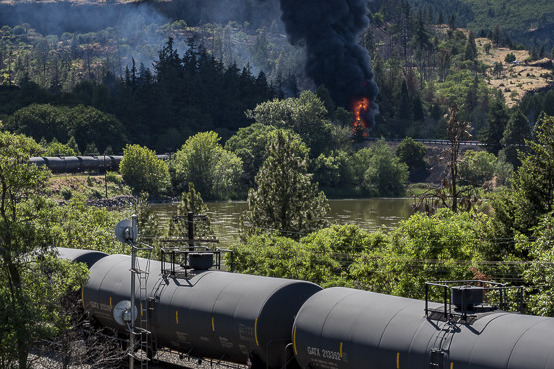Railroad Fails to Circumvent Tribal Treaty Rights and Columbia Gorge Protection Laws
For Immediate ReleaseContact: Nathan Baker, Friends of the Columbia Gorge, (971) 634-2026
Eugene, Oregon: Today, the Federal District Court of Oregon dismissed a lawsuit brought by Union Pacific Railroad (UP) involving the railroad’s proposal to build more than four miles of new railroad tracks through the town of Mosier and on adjacent lands in the Columbia River Gorge National Scenic Area. Mosier was the site of a fiery oil train derailment in June 2016. In its lawsuit, Union Pacific sought to exempt its proposed rail expansion project from federal Gorge protection laws and tribal treaties. In a written order issued on March 8, District Court Judge Ann Aiken dismissed the lawsuit because the railroad had failed to include three Northwest Indian Treaty Tribes as defendants in the case.
In January 2015, Union Pacific filed a land use application with Wasco County pursuant to the Columbia River Gorge National Scenic Area Act, seeking to build a second mainline track in the Mosier area. In November 2016, the Wasco County Board of County Commissioners denied the rail expansion project because it would infringe on tribal treaty rights and violate federal Gorge protection laws.
The Wasco County Commissioners’ decision is currently on appeal to the Columbia River Gorge Commission. But rather than allow that appeals process to proceed, Union Pacific in January 2017 sued the Wasco County Commissioners, the Wasco County planning director, and six of the thirteen Gorge Commissioners in federal court, arguing that the Gorge Commission’s appeal process should be halted and the railroad should be allowed to proceed with the project without any National Scenic Area permits.
In her ruling today, Judge Aiken dismissed Union Pacific’s lawsuit because the railroad had failed to name the Confederated Tribes and Bands of the Yakama Indian Nation, the Confederated Tribes of the Warm Springs Reservation, and the Confederated Tribes of the Umatilla Indian Reservation as defendants in the case. Because the Tribes’ treaty rights were at the heart of the case, the railroad’s failure to name them as defendants required dismissal of the case pursuant to federal court rules.
“The court’s decision today is a victory for the tribes, Gorge communities like Mosier, and the Columbia River Gorge National Scenic Area,” said Michael Lang, conservation director for Friends of the Columbia Gorge, one of the parties in the case. “If Union Pacific had its way, it would have been able to do whatever it wanted within a federally designated National Scenic Area, wreaking havoc all along the Columbia River.”
In the lawsuit, Union Pacific had sought to enjoin the Columbia River Gorge Commission’s appeals process from proceeding. Now that the railroad’s lawsuit has been dismissed, the Gorge Commission’s appeal process will continue. An appeal hearing before the Gorge Commission is scheduled for June 13, 2017.
“The Gorge Commission is extremely pleased with the outcome of this case and grateful for the Columbia River Treaty Tribes’ assistance in getting this case dismissed early in the litigation,” said Jeff Litwak, counsel for the Columbia River Gorge Commission. “The pending appeals of Wasco County’s decision are again solidly back before the Gorge Commission. We are looking forward to receiving the parties’ briefing, reviewing the record, and considering the parties’ oral arguments.”
Dr. Pat O’Herron, president of Oregon Physicians for Social Responsibility, another party in the case, stated, “The court ruled against Union Pacific, which worked to quash the rights of sovereign nations. We celebrate today’s victory and look forward to June 13—our next opportunity to protect vulnerable communities from the risks of evacuation, injury, and death associated with fossil fuel transportation.”
The Federal Railroad Administration has reported that Union Pacific has more rail accidents per miles traveled, more derailments per accident, and more accidents caused by its failures to maintain its equipment than national railroad industry averages. UP’s safety failures resulted in devastating consequences on June 3, 2016, when UP caused an explosive, fiery oil train derailment in Mosier, Oregon. During this incident at least sixteen oil tank cars were derailed, at least five of which caught on fire or exploded. At least 42,000 gallons of crude oil were spilled, some into the Columbia River. Approximately one hundred Mosier residents had to be evacuated because of the serious dangers posed by UP’s derailed and burning oil tank cars.
Also see:
March 8, 2017: KATU - Judge dismisses Union Pacific's lawsuit over Gorge plan to build trackMarch 8, 2017: Portland Business Journal - Federal court dismisses Union Pacific's lawsuit in Gorge track expansion dispute
March 8, 2017: KXL - Federal Judge dismisses Union Pacific suit
March 9, 2017: Oregon Business - Union Pacific lawsuit tossed out
March 9, 2017: GorgeRadio - Union Pacific Suit Dismissed By Federal Judge
March 9, 2017: Gorge News Center - Federal Judge dismisses Union Pacific lawsuit
?March 14, 2017: The Dalles Chronicle - Federal court dismisses UP lawsuit?

